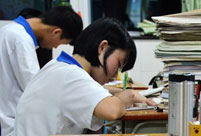 Luoyang aims to become 'Chinese Culture City'
Luoyang aims to become 'Chinese Culture City'
 Century-old jade disc found confirms ancient legend
Century-old jade disc found confirms ancient legend
 A serious mind behind Chinese leader
A serious mind behind Chinese leader
 Panda Cubs to Predict 2014 World Cup Winners
Panda Cubs to Predict 2014 World Cup Winners
 China Southern Airlines flight attendants win titles in service contest
China Southern Airlines flight attendants win titles in service contest
 Pupil's performance art persuades people to stop smoking
Pupil's performance art persuades people to stop smoking
 Nie Chenxi's clay tigers
Nie Chenxi's clay tigers
 Children's Day wishes
Children's Day wishes
 Chinese Kung Fu charms Silicon Valley
Chinese Kung Fu charms Silicon Valley
 Tranquil Yankou ancient town
Tranquil Yankou ancient town
A Chinese person drinks on average five cups of coffee a year. In a small town of south China's Hainan Province, this rises to 200 a year.
The figure, which is comparable to the world's average of 240 cups, has impressed international coffee dealers who are seeking to take a share of the market in China.
"I do not believe China will become the world's largest coffee consumption market in the next decade until I see it for real. But with more middle-income families, the Chinese are drinking more coffee," said David Kiwanuka, a coffee dealer with the Guangzhou office of Beijing Chenao Coffee Co., a Sino-Uganda joint venture.
Fushan Town in Chengmai County of Hainan, where local farmers started growing coffee in the early 1930s, has nurtured a strong coffee culture. Nearly 100 companies from different countries have opened outlets to promote their brands in the subtropical town.
"I was impressed at how the Chinese love drinking coffee. They have started to show great interest in coffee culture, which has made me see the huge market potential in this country," said Melaku Legesse, consul general at Consulate General of the Federal Democratic Republic of Ethiopia in Guangzhou.
Data from China Coffee Association Beijing (CCAB) showed that coffee consumption growth in the country is increasing at an annual rate of 15 percent, which is about seven times more than the average world growth rate.
According to the association, the figure may continue to expand at a pace of 15 to 20 percent annually, making China the most attractive coffee consumption market by 2020.
BEANS OR LEAVES?
Despite the fast expansion, it is unlikely that coffee will replace tea as the number one drink of choice in China, given the longstanding tea-drinking tradition in the country, CCAB Chairman Ji Ming said.
Foreign coffee brands were first introduced to China during the 1980s. Brands such as Nestle and Starbucks have played a significant role in creating a coffee culture in the country.
Ji said the culture is popular in first-tier cities like Beijing and Shanghai, as well as some southern provinces including Hainan and Fujian. But for most other regions, coffee is still an expensive "Western import".
"Even in Beijing and Shanghai, the coffee consumption level remains stubbornly lower than 30 cups per capita," Ji said, adding that the country's coffee culture is not sufficiently mature.
Annie Huang, general director with Food and Dining Culture Committee of Guangdong Food Culture Research Institute, said that China's younger generation with growing purchasing power are willing to pay more for new experiences.
"To them, Starbucks represents a luxury and fashionable experience. Many of them are attracted by this brand rather than the coffee itself. They can tell what kind of tea is good, but they can't do so with coffee," Huang said.
But Huang also admitted the huge potential for consumption and that the coffee-drinking culture has not yet reached its peak.
 |
 Can't take eyes off national teams in World Cup
Can't take eyes off national teams in World Cup Graduation photos bring memories back to life
Graduation photos bring memories back to life Art school students present works in Nanjing
Art school students present works in Nanjing Xinjiang's first high-speed railway goes on trial run
Xinjiang's first high-speed railway goes on trial run 3D Sea-life Themed Art Garage unveiled in Zhengzhou
3D Sea-life Themed Art Garage unveiled in Zhengzhou
 Creative Photos go viral during graduation season
Creative Photos go viral during graduation season Students in last-minute effort for Gaokao
Students in last-minute effort for Gaokao Opening ceremony of 67th Cannes Film Festival
Opening ceremony of 67th Cannes Film Festival Pulse of Xiamen - Int'l Yoga art festival in May
Pulse of Xiamen - Int'l Yoga art festival in May Top 20 hottest women in the world in 2014
Top 20 hottest women in the world in 2014  Dali, an ideal summer vacation destination
Dali, an ideal summer vacation destination Xichan Temple's little monk hit the Internet
Xichan Temple's little monk hit the Internet Monologue of a modern dancer
Monologue of a modern dancer College girl proposes to boyfriend on Weibo
College girl proposes to boyfriend on Weibo Special operation members in counter-terrorism training
Special operation members in counter-terrorism trainingDay|Week|Month